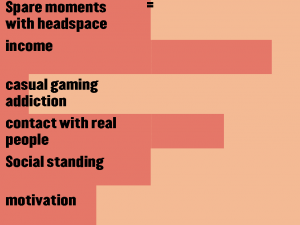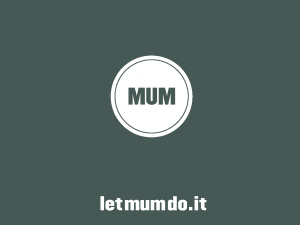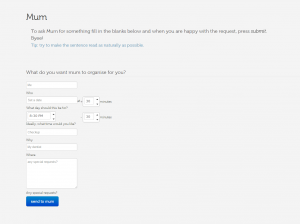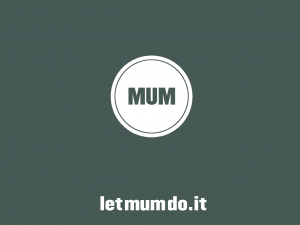Mum
I just finished the GA Product management course, and as a part of that I worked on a ‘product’ that I ended up presenting. I’ll write a bit more about it soon, but to get a general overview of it, here’s the pitch that I gave at the final presentations. (If the presentation isn’t working, then you can see it here, and there are more details after the fold too.)
 Opening slide, this just sits there while I faff about making sure that everybody is paying attention.
Opening slide, this just sits there while I faff about making sure that everybody is paying attention.
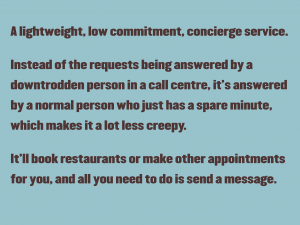 If I only had 30 seconds to tell you about what mum is then this is what I’d say, but before I tell you much more I’m going to tell two stories.
If I only had 30 seconds to tell you about what mum is then this is what I’d say, but before I tell you much more I’m going to tell two stories.
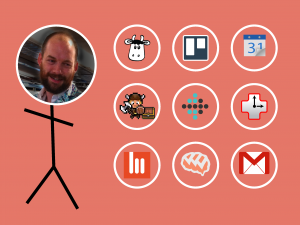 So this is me, I’m disorganised. So in order to operate at a level that feels to me like the kind of efficiency that I see other people working at I use all these tricks, hacks and services. I’m a big fan of the working smart not hard philosophy, but it seems that no matter how smart I think I am, things slip through the cracks.
So this is me, I’m disorganised. So in order to operate at a level that feels to me like the kind of efficiency that I see other people working at I use all these tricks, hacks and services. I’m a big fan of the working smart not hard philosophy, but it seems that no matter how smart I think I am, things slip through the cracks.
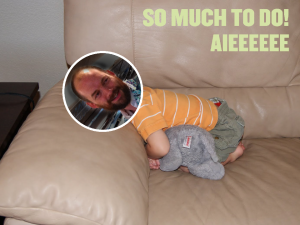 So here’s the story proper: Some night’s I’ll go to bed, and I’ll toss and turn, thinking about all the things that I need to do
So here’s the story proper: Some night’s I’ll go to bed, and I’ll toss and turn, thinking about all the things that I need to do
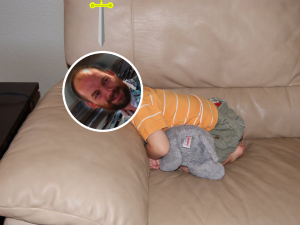 I can feel them hanging over me, and I worry. Turning each thing over in my head, and not getting any resolution. (Worrying is not a daytime activity for me generally, I seem frustratingly relaxed about things to most people.)
I can feel them hanging over me, and I worry. Turning each thing over in my head, and not getting any resolution. (Worrying is not a daytime activity for me generally, I seem frustratingly relaxed about things to most people.)
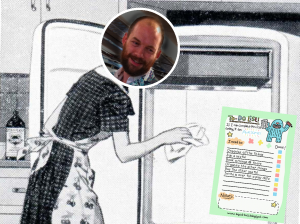 So I’ll get up, and I’ll do something that feels productive, like cleaning my fridge and managing my todo lists - getting them into top shape and ready to take on the world. Then I go to bed and sleep like a baby, confident that my troubles are over.
So I’ll get up, and I’ll do something that feels productive, like cleaning my fridge and managing my todo lists - getting them into top shape and ready to take on the world. Then I go to bed and sleep like a baby, confident that my troubles are over.
 Then the next day I’ll get up and go to work. Almost straight away I’ll get hijacked by some sort of ‘emergency’ or something interesting and I’ll forget all about my good intentions.
Then the next day I’ll get up and go to work. Almost straight away I’ll get hijacked by some sort of ‘emergency’ or something interesting and I’ll forget all about my good intentions.
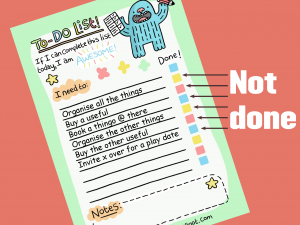 Then not long after I’ll be back where I was, my to do list will be all not done and I’ll be sad.
Then not long after I’ll be back where I was, my to do list will be all not done and I’ll be sad.
 I think the last time I was really organised was when I was being organised by my mum. She’d make sure that I went to the dentist, the optician, she’s make sure I had my swimming stuff, my lunch. If I needed it to happen, she made sure that it did.
I think the last time I was really organised was when I was being organised by my mum. She’d make sure that I went to the dentist, the optician, she’s make sure I had my swimming stuff, my lunch. If I needed it to happen, she made sure that it did.
 Meet Ross, He was a bit like the fat controller at Eurotunnel…
Meet Ross, He was a bit like the fat controller at Eurotunnel…
 ..(except he’s really thin) and this is Alice. She’s a film Professor in London.
..(except he’s really thin) and this is Alice. She’s a film Professor in London.
 They had a baby (that’s a face, not a fingernail). Alice is about to get tenure, and Ross was thinking about a change of scene anyway so he decided to become a mum.
They had a baby (that’s a face, not a fingernail). Alice is about to get tenure, and Ross was thinking about a change of scene anyway so he decided to become a mum.
 The top bar is Ross’s day before the baby, and the green bits are free time, the bottom bar is his day after the baby. There are still some green bits, but they are pretty chopped up
The top bar is Ross’s day before the baby, and the green bits are free time, the bottom bar is his day after the baby. There are still some green bits, but they are pretty chopped up
 As a result of this fragmented free time, and as a way to keep his unusually sharp brain occupied, he’s developed a massive addiction to candy crush saga!
As a result of this fragmented free time, and as a way to keep his unusually sharp brain occupied, he’s developed a massive addiction to candy crush saga!
- We have roughly equal headspace to do stuff
- I have more income because I’m working
- He has a casual gaming addiction, which shows that he’s into doing mentally taxing things for short periods
- I have more contact with real people, especially people who don’t want to talk about babies!
- We both have equal social standing. This is an important point, a lot of people feel creepy or exploitative when they get people to do things for them if they feel like are the boss, but much better about it if they are equals or subordinate. A simple experiment is to think about how you feel about a dentist and a shoeshine; in the end they are both polishing something for you.
- He has a bit more motivation to do little tasks than I do. For him they redress some of the inequalities above, and for me I’m demotivated because doing small things breaks my flow state and a 2 minute call turns into half an hour of context switching.
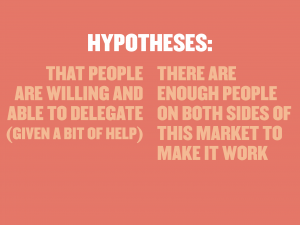 I have done simple tests to validate these hypothesises, but in order to test them more deeply I need to start building something that actually resembles the planned product!
I have done simple tests to validate these hypothesises, but in order to test them more deeply I need to start building something that actually resembles the planned product!
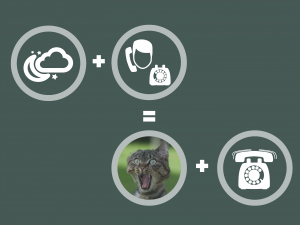 Here’s an example: It’s the middle of the night, and I want to book something like an appointment at the dentist. If I leave it until tomorrow I know I’ll forget to do it, but if I call them right now then there’ll be nobody there. (Sad face.)
Here’s an example: It’s the middle of the night, and I want to book something like an appointment at the dentist. If I leave it until tomorrow I know I’ll forget to do it, but if I call them right now then there’ll be nobody there. (Sad face.)
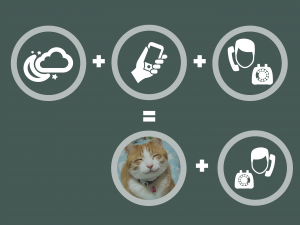 Or if I send a message to mum, it’ll go into the queue, then someone will pick it up at a sensible time and be able to make the call. (Winner!)
Or if I send a message to mum, it’ll go into the queue, then someone will pick it up at a sensible time and be able to make the call. (Winner!)
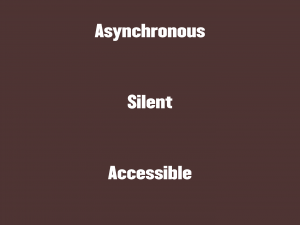 The big advantages of mum are that it’s:
The big advantages of mum are that it’s:
- Asynchronous, which means that you and the other party that you want to deal with don’t need to be available at the same time (like the example above).
- Silent, so that you can ‘make calls’ when you should really be quiet, like deadspots in meetings where you are just waiting for an important bit to come up.
- Accessible. Not everyone is great with phone calls. If there is a language barrier, you are deaf, or are just shy, then having a layer in between is really helpful.
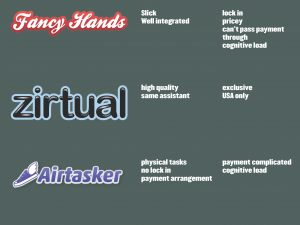 There is already some competition out there:
There is already some competition out there:
First up is Fancy Hands. Their service is amazing, if you don’t have a Fancy Hands account you should get one! They are really well integrated with all sorts of systems (Google calendar, Trello, etc.) and they can handle all the stuff I’ve just been talking about. However they have very limited ability to actually make things happen because they can’t handle payments, so if you need to secure a booking with a card then they can tell you how to book your appointment and how much it’ll cost, but not actually make the booking1. They also are a subscription service so if you don’t make your allocated number of requests each month they just disappear. The biggest problem, and one that comes up for all of these is the cognitive overhead of making the request.
Zirtual is supposed to solve a lot of these problems because they are a super exclusive, invitation only VA service. They handle payments, but the cognitive overhead is still there, as is the lock in. I’m using Zirtual as a placeholder for any number of other services that provide dedicated assistants.
Airtasker is the third type of service. One day the first two types of thing could be replaced by Artificial Intelligence, but Airtasker specialises in physical tasks. For example I had someone tidy up my front garden, and someone else take all the shoes that needed new heels to the cobbler. They don’t have lock in/subscription, but they do have the cognitive overhead of a blank space to craft your request.
 This is what you see when you use a normal outsourcing service. It’s hard to remember to include all the things that you take for granted. So hard in fact that Tim Ferris has a long blog post about it.
This is what you see when you use a normal outsourcing service. It’s hard to remember to include all the things that you take for granted. So hard in fact that Tim Ferris has a long blog post about it.
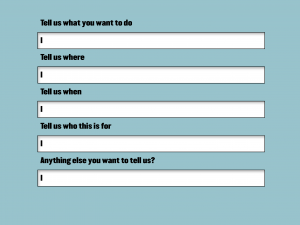 The plan with mum is to have structured forms to draw the request out of the user and to dramatically reduce the cognitive overhead.
The plan with mum is to have structured forms to draw the request out of the user and to dramatically reduce the cognitive overhead.
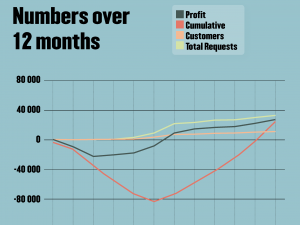 If we crunch some numbers for a bit now, here’s how revenue and users relate.
If we crunch some numbers for a bit now, here’s how revenue and users relate.
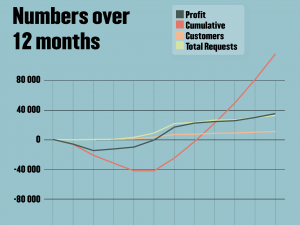 Things look a lot rosier if I don’t pay myself a load of money from day one, but this does include a full time designer and developer as well as a few support people.
Things look a lot rosier if I don’t pay myself a load of money from day one, but this does include a full time designer and developer as well as a few support people.
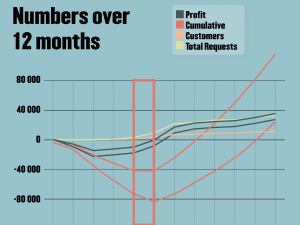 The turning point seems to happen between 3000 and 7000 active users. If you want to see how this is calculated then look at the model here.
The turning point seems to happen between 3000 and 7000 active users. If you want to see how this is calculated then look at the model here.
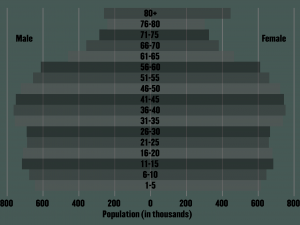 I was a bit concerned that 7000 users was an unrealistic target to hit so soon after launch, so here’s a market sizing sketch. This is the age pyramid for Australia.
I was a bit concerned that 7000 users was an unrealistic target to hit so soon after launch, so here’s a market sizing sketch. This is the age pyramid for Australia.
 I’m aiming at people between 25 and 45 who are in a pre-PA stage of their life
I’m aiming at people between 25 and 45 who are in a pre-PA stage of their life
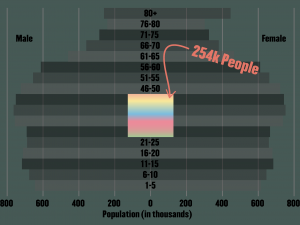 Who earn between $65k and $150k a year. Once you slice Sydney up with those constraints2 you get about 254k people, so 7000 is 2% of those guys, and that’s just from Sydney. I’m much less worried about that now.
Who earn between $65k and $150k a year. Once you slice Sydney up with those constraints2 you get about 254k people, so 7000 is 2% of those guys, and that’s just from Sydney. I’m much less worried about that now.
 The idea is to grow through referrals, rewarding/bribing people though non-monetary things like coffees (people will do way more for a coffee than for $3.50!)
The idea is to grow through referrals, rewarding/bribing people though non-monetary things like coffees (people will do way more for a coffee than for $3.50!)
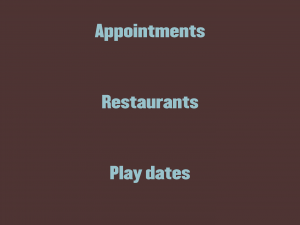 You can use mum to do things like booking appointments or restaurants, but my favourite is play dates; mum knows about your calendar, so you just get mum to arrange for you to hang out with one of your friends on a repeating schedule. E.g. I want to hang out with Adam at least once a month, Bob at least once every 3 months and I should probably see Chris once a year.
You can use mum to do things like booking appointments or restaurants, but my favourite is play dates; mum knows about your calendar, so you just get mum to arrange for you to hang out with one of your friends on a repeating schedule. E.g. I want to hang out with Adam at least once a month, Bob at least once every 3 months and I should probably see Chris once a year.
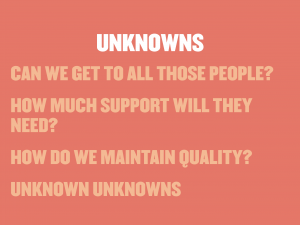 These are pretty self explanatory. It’s going to take some work to find answers to them all.
These are pretty self explanatory. It’s going to take some work to find answers to them all.
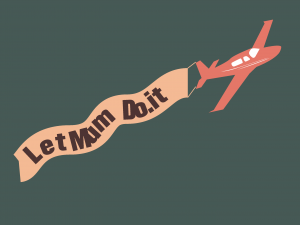 The next step is to turn the prototypes into an MVP and launch it. Very gently at first, learning all the way, but adding new customers all the time.
The next step is to turn the prototypes into an MVP and launch it. Very gently at first, learning all the way, but adding new customers all the time.
 In the future the plan is to introduce some AI to make things easier for the mums. This is a two sided market so the happier the mums are the better quality/more consistent their jobs will be and they’ll drive more referrals.
In the future the plan is to introduce some AI to make things easier for the mums. This is a two sided market so the happier the mums are the better quality/more consistent their jobs will be and they’ll drive more referrals.
We’ll be able to do something with the data we get. Are there a lot of requests for a certain type of booking? maybe that person ought to get an on-line system? Are certain types of people booking certain types of things?
The one thing that I think is most interesting is that we’ll have an army of mums who can be called on to do all kinds of tasks!
If you’ve got any questions or would like to be included in the first round of testing, make a comment below and I’ll let you know how to get involved.

